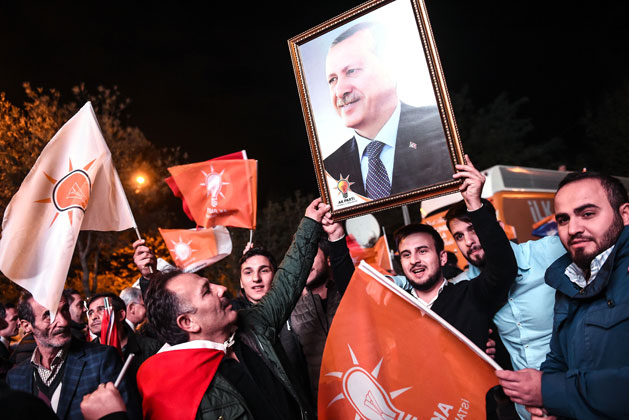ISTANBUL — Turkey's Justice and Development Party is set to form a single-party government once more after a stunning election turnaround that strengthened the hand of strongman President Recep Tayyip Erdogan but sparked concerns it could further divide the country.
The conservative Islamic-leaning AKP reclaimed the majority it lost just five months ago, confounding opinion polls that had predicted another hung parliament.
Emboldened by the landslide win, Erdogan said the people had voted for "stability" after renewed conflict with Kurdish rebels and a wave of bloody jihadist attacks, and called on the entire world to respect the outcome.
Turkish stocks and the lira soared on the results, which ended the political uncertainty stoked by the inconclusive June vote.
But many Turks were wary of further polarisation under a more powerful AKP and the possible threat to democratic rights and freedoms.
The European Union said the vote showed the "strong commitment" of Turks to democracy.
But the pan-European Organisation for Security and Cooperation in Europe (OSCE) said in a damning report that the election was marred by a media crackdown and violent attacks, and that the campaign was characterised by "unfairness".
Turkey's main opposition Cumhuriyet newspaper labelled the AKP win a "victory of fear" feeding on worries about security and the economy.
Columnist Can Dundar said society was now split in two: "Those who are ready to die for Erdogan and those who cannot stand him anymore have been torn apart."
The AKP — which until June had won all elections since it first came to power in 2002 — secured almost half the vote to secure 317 seats in the 550-member parliament, according to latest results.
Signs of autocratic rule
The outcome is a huge personal victory for the 61-year-old "Sultan", who may now be able to secure enough support for his ambitions to become a US-style executive president.
That has set alarm bells ringing about how much power will rest in the hands of a man who critics say is already showing signs of autocratic rule by clamping down hard on any opponents, including the media.
Analysts voiced concerns that a stronger AKP could pursue its attacks on opposition businesses and media, as well as maintain a hardline stance on the Kurdish crisis.
Prime Minister Ahmet Davutoglu called on all parties to agree on a new civilian constitution to replace a 1980 post-coup military-drafted charter, something that has been delayed for years.
“Let’s work together towards a Turkey where conflict, tension and polarisation are nonexistent,” he told thousands of supporters outside AKP headquarters in Ankara.
‘What is awaiting us?’
AKP supporters honked their horns in celebration but many Turks greeted the result with deep disquiet, and clashes erupted briefly in the main Kurdish city of Diyarbakir between police and angry demonstrators.
“I’m horrified. I don’t want to live in this country anymore because I don’t know what is awaiting us,” said Guner Soganci, 26, a waitress in Istanbul.
The AKP lost its majority for the first time in 13 years in June when the pro-Kurdish People’s Democratic Party (HDP) entered parliament in a historic breakthrough.
The political landscape has changed dramatically since then, with the country even more divided along ethnic, religious and political lines.
Analysts said it appeared voters had deserted nationalist and Kurdish parties after a surge in violence between Turkish forces and the outlawed Kurdistan Workers’ Party (PKK) in July led to the collapse of a fragile 2013 truce.
Erdogan said the result “delivered an important message for the PKK: oppression and bloodshed cannot coexist with democracy”.
Support fell for the HDP, which some accuse of being a PKK front, and it only just scraped past the electoral threshold of 10 percent to stay in parliament.
There was disappointment for the main opposition Republican People’s Party (CHP), which had hoped to join a coalition, and support for the Nationalist Movement Party (MHP) also fell.
Turkey was also rocked by a string of attacks blamed on the Daesh group, including twin suicide bombings at an Ankara peace rally last month that killed 102 people — the bloodiest in Turkey’s modern history.
The international community will also be watching Turkey’s policy towards neighbouring Syria, after it was cajoled into joining the US-led coalition against Daesh and launched its own “war on terrorism” against the jihadists, PKK fighters and even US-backed Syrian Kurds.
Analysts say the EU, desperate for help to solve the migrant crisis sparked largely by the Syrian war, has little option but to deal with Erdogan on his own terms.
Turkey itself is sheltering over two million refugees, many more than in the European Union.
Another crucial issue for the new administration will be the faltering economy, which has seen growth slow sharply in recent years.
The initial reaction on financial markets was positive, but economists said it was likely to be short-lived.
The lira jumped 4 per cent to 2.8 against the US dollar while stocks soared over 5 per cent.
